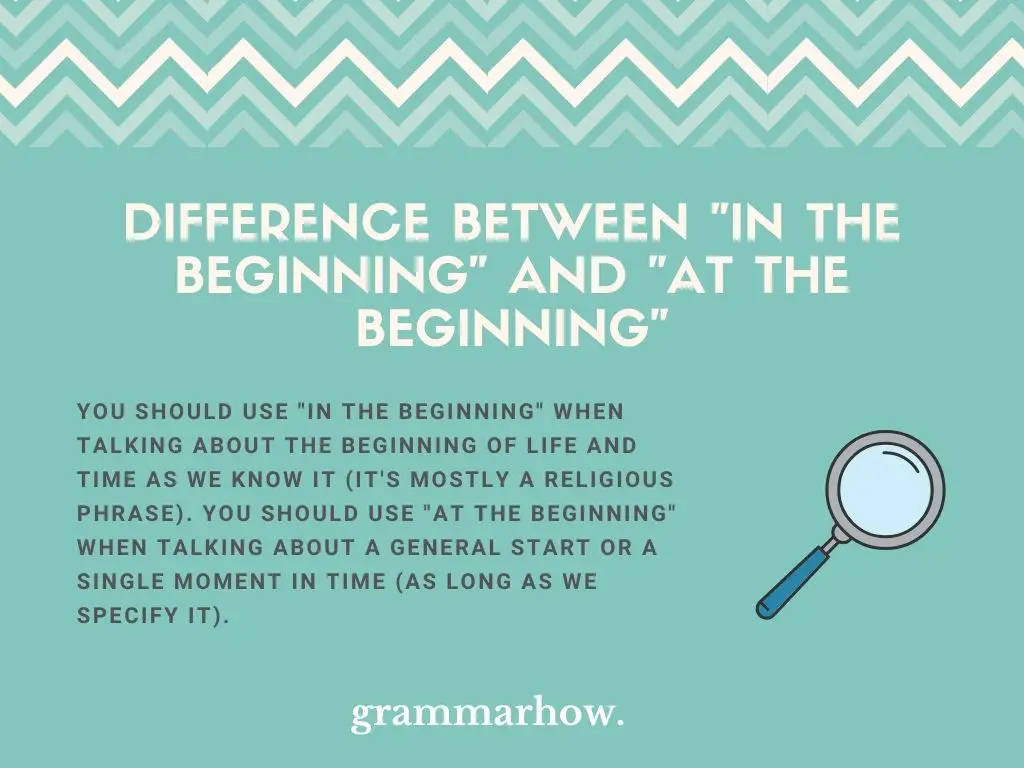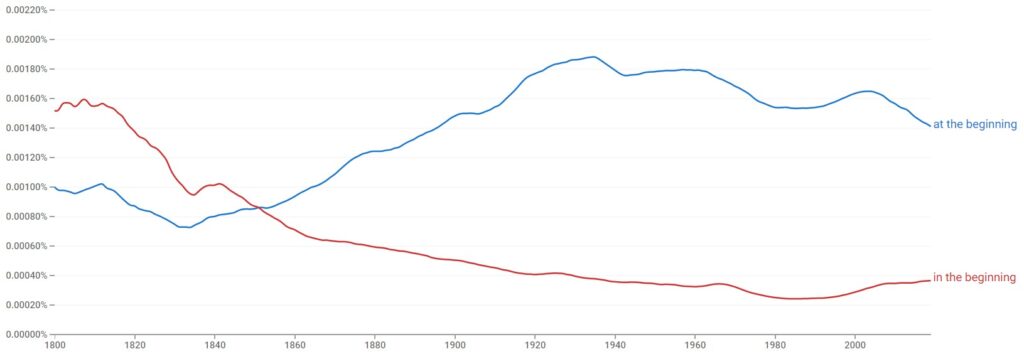While prepositions like “at” and “in” are small words, that doesn’t stop them from having a profound impact on the overall meaning of a phrase. This article will examine the differences between “in the beginning” and “at the beginning” and which one you should use.
What Is The Difference Between “In The Beginning” And “At The Beginning”?
You should use “in the beginning” when talking about the beginning of life and time as we know it (it’s mostly a religious phrase). You should use “at the beginning” when talking about a general start or a single moment in time (as long as we specify it).

Typically, people are more inclined to use “at the beginning.” We can also show you the differences between the two phrases by mixing them up slightly:
- In the morning
- At 7 o’clock
Here, we use “in” to describe “the morning,” which is the start of the day. This is the specified time period (the day), and the morning is “in the beginning” of the day.
We use “at” to describe the specific time, “7 o’clock.” This works because “at the beginning” simply describes a single time or general starting point, and if someone’s day starts at “7 o’clock,” then that would be the “beginning” to them.
Is “In The Beginning” Or “At The Beginning” Used The Most?
It might help you to see which of the two phrases is used more often. That way, you’ll have a better understanding of which preposition is more likely to come up.
According to Google Ngram Viewer, “at the beginning” is by far the most popular choice of prepositions. It’s used more because it refers to more general times, while “in the beginning” seems only to refer to the specific beginning of the universe or the world.

Examples Of How To Use “In The Beginning” In A Sentence
“In the beginning” is mostly found in religious contexts. It refers to their being an origin of time in some way, like how God might have created the world and everyone in it “in the beginning.”
Some examples might help you to understand when it works best:
- In the beginning, there was nothing but trees.
- In the beginning, there wasn’t much for anyone to do.
- In the beginning, we found it hard to come up with new innovations because we weren’t granted that power.
- In the beginning, there was nothing to do except survive.
- In the beginning, people struggled for food and water.
“In the beginning” works only to talk about the dawn of time (or some other specified time period). It mostly works in religious texts because they believe that there was a timeline for the creation of humankind and the Earth.
Examples Of How To Use “At The Beginning” In A Sentence
“At the beginning” is the more popular choice of the two. We can use it in much broader contexts than just religious ones, and you’ll see how in the following examples.
- At the beginning of my day, I always make sure to drink five egg whites.
- At the beginning of the workday, people always greet me with a smile.
- At the beginning of the week, I’m always happy to go to work.
- At the beginning of the movie, I had a hard time concentrating.
- At the beginning of the fair, my girlfriend got lost, and I spent the whole time trying to search for her.
“At the beginning” usually comes with a time frame after it, like “of the day” or “of the week.” This helps us to specify the beginning of the current time frame that we’re working with.
It’s not common to see this:
- At the beginning, I had a good time with her.
Even if the context is clear, we generally don’t write in this way. “At the beginning” doesn’t work as a standalone clause, so we must try to specify what the time frame we’re talking about is:
- At the beginning of the relationship, I had a good time with her.
“In The Beginning” And “At The Beginning” – Synonyms
You might be interested to learn about a few synonyms of the two phrases. While they’re not synonymous, we can use the following synonyms in both cases, depending on the context.
- To begin with
- At the start
- To start with
- In the first place
- Originally
- Earlier
- At first
- First
- From day one
- From the word “go”
All of these synonyms work in place of either “in the beginning” or “at the beginning.” We use them to talk about things that have happened for as long as we are able to remember them.
“At The Beginning Of The Year” Or “In The Beginning Of The Year”?
We’ve specified now “at the beginning” and “in the beginning” work now, so these next few sections should be easier to deal with.
“At the beginning of the year” is correct because we specify the time period with “of the year.” When writing “at the beginning,” we always need to specify the time period.
“In the beginning of the year” is wrong because we can’t use “in” with a time frame like this. “In the beginning” only works when talking about the entire time frame of the Earth.
- Correct: At the beginning of the year, I made many promises to myself – and I broke them all!
- Incorrect: In the beginning of the year, you made it clear to me what your feelings were about us.
“In The Beginning Of Next Week” Or “At The Beginning Of Next Week”?
The same rules apply when we look at these examples. There is only one choice that is correct.
“At the beginning of next week” is correct because “of next week” helps us to specify the exact time we’re beginning with. We do not use “in the beginning” when we’re also specifying a more specific time frame.
- Correct: I’m going to have to look into this at the beginning of next week.
- Incorrect: I will make sure to do that in the beginning of next week.

Martin holds a Master’s degree in Finance and International Business. He has six years of experience in professional communication with clients, executives, and colleagues. Furthermore, he has teaching experience from Aarhus University. Martin has been featured as an expert in communication and teaching on Forbes and Shopify. Read more about Martin here.
